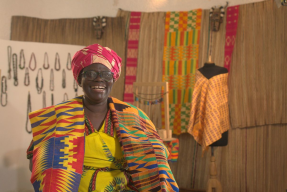
Compiled by Philip Issa | KF17 | Palestine
We’ve all had these moments: Trying to impress a native speaker with our ability to speak their language, we compose an elegant sentence in our minds, open our mouths, and… proceed to swallow our feet whole. Indeed, we Kiva Fellows have had no shortage of these incidents – we’ve twisted and tortured whole phrases so that they come out no better suited than to embarrass and offend.
So here are a few stories of us Fellows shattering our carefully constructed, professional identities with a spectacular “whoops!”
Can anyone tell me where I can find a clean toilet to drink out of?
Micaela, Mozambique: fluent in Brazilian Portuguese, but the Mozambican variety? It’s a little different. In mid-April, she sent me a message informing me, “Welp, apparently I’ve been calling the sink a toilet for the past few months, and no one has felt the need to correct me.” The consequences? Micaela has been going around showing off her bona-fides, telling the locals that she, too, doesn’t need to drink bottled water: she thinks the toilet water is just fine.
“Since I learned Brazilian Portuguese,” she wrote, “I often find that many of the words I know don’t mean anything here, but this is the first time a word I have used actually means something else entirely.”
Actually, the Kiva Fellowship is really boring
Chris writes from Azerbaijan: “There is a verb in Russian, скучать, that means ‘to be bored.’ I’ve known that for a while. What no one ever told me is that скучать has another meaning, ‘to miss (something)’ – which, if you think about it, is almost the exact opposite. Why, Russian? Why?
My time in Azerbaijan gave me occasion to regret not knowing both meanings. Specifically, towards the end of my placement there, my Kiva Coordinators, the loan officers, and the administrators of the MFIs I worked with were all sad that I was heading out, and they would ask me, ‘Are you going to miss Azerbaijan after you leave?’ To which I would respond, ‘No, of course not!’
‘Really? You won’t miss us? Not even a little?’
‘No! Why would I miss you?’
I only recently realized that they had not, in fact, been asking whether I was bored with Azerbaijan. I suppose I have to apologize to every Azeri I meet now.”
Is that a trumpet?
Carrie, from Peru:
“What is your instrument called?” (I didn’t know the Spanish word for “drums”)
Wrong: ¿Cómo se llama tu instrumento?
Right: ¿Cómo se llama el instrumento que tocas? = What is the name of the instrument you play?
Why: A very awkward question to ask a guy.
You can’t impress all the people all the time
Ryan in Liberia has a unique story because in Liberia, they speak English. Ryan, from California, also speaks English. But all is not as it seems:
“In Liberian English,” he writes, “strange means new or different.” So, one day, seeking to impress the higher-ups at a meeting, Ryan donned his nicest coat, gave himself a clean shave, and showed up to work with a beaming smile… only to be told that he looked “strange.” Puzzled, he said, “Thanks?” and laughed awkwardly.
A few days later, upon returning to the main office from a branch visit, the staff gathered around to listen to his stories and said, “Oh, that place must have been strange to you.” “No,” he replied, “it was actually quite nice, thank you.”
“It took me a few days to figure out that by strange they meant different without the negative connotations,” he concludes.
Simon never said
Jamie in the Philippines writes:
“One afternoon, a few days before Holy Week in April, I was sitting in the Community Economic Ventures, Inc. (CEVI) office and learning a few Bicolano expressions in preparation for a trip to the Caramoan Peninsula, which is in the southeast part of Luzon in the Philippines. I found a webpage that had basic terms, which I would deploy upon my arrival to impress and produce smiles from the locals.
But the folks at CEVI do not speak Bicolano; they speak Bisaya and Tagalog. The languages overlap in some cases, while in others there are vast differences. For example, “good morning” in Bisaya is “maayong buntag”, while in Bicolano it is “maray na aldaw”.
I started reading the Bicolano expressions out loud to my colleagues, trying to impress them with my new knowledge and gauge if any were familiar. When I got to the translation of “sorry”, their eyes widened and one girl shrieked, “What did you just say?!”
“Patawarun. It means ‘sorry’ in Bicolano. Is that close to Bisaya?”
“What?! Are you serious? Let me see that.”
“Pa-ta-wa-run, pa-ta-wa-run”, I repeated, thinking that I was mispronouncing the word and that they would recognize it after a few times.
But the problem wasn’t with the pronunciation – I was pronouncing it just fine. The problem was that Bisaya has a different word for “sorry,” and by repeating “patawarun” in front of my colleagues, I was in fact telling them to bend over and show me their behinds.
Oops! It was my turn to laugh. Languages in the Philippines can be tricky.”
Does it really matter who ordered what?
Glacé |glasay|
adjective, french – cold, fresh, icy
A story from Natalie, in Cameroon:
“It was my first beer in country, and I was quite thrilled to try a local brew. Also adding to my excitement: the fact that at 500 CFA a piece (almost exactly $1.00), not one single beer offering was smaller than 1 Liter. “Glacé ou non glacé?” the server asked. I was feeling classy so I decided to say yes to drink from a glass. When the server returned with all of the drinks for our table, I grabbed the pint glass closest to me and started pouring. The gal sitting to my right, who’d I’d only recently just met, gave me a funny look.
For weeks I went on stealing people’s mugs and glasses, thinking that “glacé” meant “in a glass” instead of it’s true translation- “cold, fresh, or icy”- until one day I decided to be a heathen a drink straight from the bottle. After ordering my beverage “non glacé”, I was confronted with a disturbing reality: warm beer. Such a simple mistake, how could I not have remembered from 9th grade that glass is “verre” in French? More importantly, I was embarrassed to have been so oblivious to what was really going on around me and not have earlier realized my misinterpretation.
But really, who wouldn’t opt for the “glacé” option? When it’s 90 degrees out and all you want is to quench your thirst (= dehydrate yourself even further), a cold adult beverage is almost always a good cure, whether in a glass or straight from the bottle.”
Who’s on first?
You already know where this story is going. And yet, it’s funny EVERY TIME. Here’s Kim (who?), from Turkey:
“Having the name Kim can be a bit comical and confusing in Turkey. You see, Kim means “who” in Turkish. So one time towards the beginning of my Fellowship, I was talking to a stranger and the conversation went like this:
“What is your name?”
“Kim.” (who?)
“You.”
“Kim.” (who?)
“You, why don’t you want to tell me your name?”
“I did, it is Kim.” (who?)
“Ok, you don’t want to tell me your name, so where are you from?”
“Idaho.” (heard as: I don’t know.)
“What do you mean you don’t know? Are you playing with me?”
“No, my name is Kim, and I am from Idaho.” (My name is Who and I’m from I-don’t-know.)
“What are you crazy or drunk and cannot remember your name or where you are from?”
“I told you my name and where I am from.”
After that he got mad, slammed his hand on the table and said you are not a very nice woman and walked away.
I think it was at that point that I was resigned to the idea that I was going to have to use my full name, Kimberly—which is a mouthful because there is nothing close to it as a women’s name in Turkish. In the beginning I would cringe when people would call me Kimberly because only my mother had previously used my full name when I was in trouble.
Perhaps as comical is that my middle name is Anne, which means mother in Turkish. So doing anything having to do with formal bureaucracy, when they see or I tell them my middle name—it immediately generates a request for formal Identification.
I don’t go to Starbuck’s very often but I start grinning when they ask me my name. Hmmm should I say Kim or Kumberlee (once written this way after 4 other scratched out attempts)? I usually glance over my shoulder to see how long the line is before answering.”
Kiva Lenders love cucumbers
Me, Palestine: It was my first week at my MFI and I was to give an “About Kiva” presentation to the entire staff, in Arabic. I was quite nervous – I had never given a presentation in Arabic before – and I knew exactly where the the biggest language trap lay:
خيار – Pronounced “khayar,” it means “option” or “choice.” Pronounced “khyar,” it means “cucumbers.”
The presentation was going – not great, but not bad – and I finally arrived at the slide containing the fateful challenge: I had to tell the MFI that their Kiva profiles need to be distinguished because, with 3,000 loans fundraising on the website at any given time, our lenders have plenty of other options.
I panicked. I knew I didn’t know the word. It was 50/50. “Khyar” or “Khayar”? I held sucked in a deep breath, lined up my words in Arabic, and blurted out, “because Kiva lenders have lots of cucumbers!”
Without missing a beat, the bank manager quipped, “I guess we should prepare a salad then!”
Everybody laughed. The tension was relieved, and the rest of the presentation went – not great, but not bad. The next day, a couple of coworkers came by and offered me salted cucumbers as a snack.
**********
Philip is a Kiva Fellow working with FATEN and Ryada in Palestine.
PREVIOUS ARTICLE
New Field Partner: Barefoot Power brings solar to rural Tanzania →NEXT ARTICLE
Kiva borrower Efia Crandon on the power of micro-lending and motherhood →














